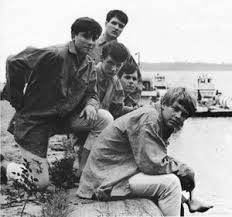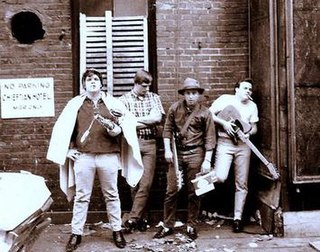"It's a Cry'n Shame" is a song written by Seab Meador and Mike Kelley and was recorded in 1966 by the Gentlemen, an American garage rock band from Dallas, Texas who were active between 1964 and 1968. It was originally released as the B-side to "You Can't Be True" but has become by far the better-known song. "It's a Cry'n Shame" has been included in several garage rock compilations and is now recognized as one of the greatest songs in the genre.

Garage Beat '66 Volume 1: Like What, Me Worry?! is the first installment in the Garage Beat '66 series of garage rock compilations issued by Sundazed Music, which is available exclusively on compact disc. It features well-researched liner notes, written by recognized garage rock authorities, which supply background information about each song and act, often including photographs of the bands. Like all of the entries in the series it is noted for good sound quality, as all of the tracks are mastered from the original studio master sources.
The Humane Society were an American garage rock band from Simi Valley, California who were active from 1965 through 1968, who are best known for their 1967 protopunk anthem, "Knock Knock."

Sir Winston and the Commons were an American garage rock band formed in Indianapolis, Indiana, in 1963. The group released two highly regarded singles, which, upon release, earned the band a regional following, and resulted in reinterest in their music over the years. At the height of their popularity, Sir Winston and the Commons were regulars at the teen dance club the Cellar, in Chicago.

The Escapades were an American garage rock band from Memphis, Tennessee who were active in the 1960s. They became one of the most popular groups in the Memphis area during the mid-1960s and recorded two singles. "I Tell No Lies", the A-side of their debut single, became a big hit in Memphis and around the South. They were signed to Verve Records, who released their follow-up, "Mad, Mad, Mad", which featured a fuzz-toned guitar line. Their work is highly regarded by garage rock enthusiasts and collectors and has appeared on various compilations.
Joe Frank and the Knights were an American garage rock band from Leland, Mississippi who were active between 1959 and 1965. They were led by Joe Frank Carollo. In the early-to-mid 1960s their popularity grew beyond the Mississippi delta and Memphis areas as they became one of the most popular groups in various parts of the Southern United States. They had a regional hit with "Can't Find a Way", which attracted the attention of ABC Records who picked up the record and re-released it for national distribution. However, the band broke up shortly thereafter, and Carollo joined the T-Bones, who later evolved into the soft rock trio Hamilton, Joe Frank & Reynolds in the early 1970s.
The Breakers were an American garage rock band from Memphis, Tennessee who were active in the 1960s. They became one of the most popular bands in the Memphis area and enjoyed considerable success with their regional hit "Don't Bring Me No Flowers ". There has been a resurgence of interest in the Breakers amongst garage rock collectors and enthusiasts in recent years.

Lawson and Four More were an American garage rock/psychedelic rock band from Memphis, Tennessee, who were active in the 1960s. The group was led by Bobby Lawson and was known for their hard, blues-based sound which, as they evolved, increasingly incorporated esoteric psychedelic elements. The group regularly worked with musician, songwriter, and producer Jim Dickinson and cut the first rock release for Memphis label, Ardent Records. As a side-project, they briefly recorded under the name The Avengers, as a Batman-themed takeoff group in 1966.
The Echoes of Carnaby Street were an American garage rock band from Miami, Florida who were active in the 1960s. They became a popular live act in the Miami area and enjoyed a minor regional hit with "No Place Or Time", released on Thames Records. In the intervening years their work has come to the attention of garage rock enthusiasts, particularly with the inclusion of "No Place No Time" on the 1986 Louisiana Punk Groups From The 60's Vol. 1 compilation, which paradoxically resulted in helping contribute to the misconception that they were a Louisiana band.
Randy and the Radiants were an American garage rock band from Memphis, Tennessee who were active from 1962 to 1966 and then again 1976–1984. They were one of the most popular groups in the Memphis area during the 1960s. Through their association with Knox Phillips, son of Sam Phillips, they signed with Sun Records and recorded two singles on the label which became hits in the region. Their second release, "My Way of Thinking", became one of the top hits in the area, reaching #1 on WGMN's charts. The group's work has today become highly regarded amongst garage rock enthusiasts and collectors.

The Dagenites were an American garage rock a band from Oxon Hill, Maryland near Washington, DC, who were active in the 1960s. They shared management and frequent billing with noted guitarist and performer Link Wray. In recent years their work has become highly regarded amongst garage rock enthusiasts and collectors and has been included on several compilations. The Dagenites are especially known for their proto-punk anthems, "I Don't Want to Try it Again" and "I'm Gone Slide", both of which have been mentioned as garage rock classics.

The Oxford Circle was an American garage rock and psychedelic rock band from Davis, California, near Sacramento, who were active from 1964 to 1967. They became a popular garage rock act with a proto-punk sound influenced by Them and other blues-based bands of the British Invasion, that, in addition to heavy guitar feedback, came to encompass psychedelia. The group began to make appearances in San Francisco, where they became a top draw in venues such as the Avalon Ballroom. They taped a show at the Avalon in 1966 and, after lying in the vaults for years, it was rereleased in 1997 on the Nuggets from California: Live at the Avalon 1966 anthology. In 1967, they released the single, "Foolish Woman" b/w "Mind Destruction", which is also included, along with several other studio outtakes, on the Nuggets from California compilation. In 1967, drummer Paul Whaley left to play in pioneering heavy rock act Blue Cheer. Lead vocalist and guitarist Gary Lee Yoder and lead guitarist Dehner Patten left to form Kak, who recorded for Epic Records. Yoder subsequently went on to join Blue Cheer in one of their later configurations.
The Wilde Knights were an American garage rock band from Longview, Washington, who were active in the 1960s. They emerged from a group known as the Furys and later the Pipers VI, who recorded several frat rock records. After becoming the Wilde Knights, they wrote and recorded two songs in 1965 which were both released as singles that year and are now recognized as garage rock classics, "Beaver Patrol" and "Just Like Me", the latter of which later provided a huge hit for Paul Revere & the Raiders. In the late 1960s they evolved into Genesis, the King Biscuit Entertainers, and American Cheese, and issued records under those various names.
The Movin' Morfomen were an American garage rock and psychedelic band from Espanola, New Mexico, who active in the 1960s. They became one of the most popular acts in New Mexico and had several local and regional hits. They are well-regarded by garage rock and psychedelic enthusiasts, and their collected works appear on the Flashbacks! anthology, issued in 1997.

The Kings Ransom were an American garage rock band from Allentown, Pennsylvania who were active from 1965 to 1968 and were a popular act in the Lehigh Valley area, as well as around Philadelphia. Their record "Shame" became a hit in Milton, Pennsylvania and received airplay in Michigan. In the intervening years the Kings Ransom's music has come to the attention of garage rock enthusiasts with the release of several of their songs on compilations such as Allentown Anglophile and Teenage Shutdown! Teen Jangler Blowout!

The Humans were an American garage rock band from Albion, New York who were active in the 1960s. They were popular in the region, touring throughout the Northeast, and enjoyed a regional hit, with the single "Take a Taxi" b/w "Warning", that received airplay in other markets around the country. "Warning" has become especially valued amongst garage rock enthusiasts and was included on the Back from the Grave compilation series.

The Brymers were an American garage rock band from San Joaquin Valley, California, who were active in the 1960s. They had a regional hit with the song "Sacrifice", which also received distribution overseas and managed to garnish airplay in parts of Europe, New Zealand, and Australia. Although they only released one single, they recorded numerous unissued tracks that would subsequently be released on CD between 2007 and 2008. The group reunited in 2007 and have since been active on stage and in the studio, releasing five CDs containing old and new material. "Sacrifice" and their version of "The House of the Rising Sun" were both featured in the film Jobs starring Ashton Kutcher. Their song "I Want to Tell You" was included in a scene from the ABC TV series Once Upon A Time.
The Grifs were an American garage rock band from Charlotte, North Carolina, who were active in the 1960s. Their song, "Catch a Ride" became the number one hit in Charlotte and did well in markets around the Carolinas, and reached number one in Birmingham, Alabama. The group was able to secure airplay in northern markets, such as in Lansing, Michigan, where it reached number one, as well as in the Detroit area and parts of Canada. They were invited to open for the Amboy Dukes in Detroit, where they began to play frequent engagements in the Michigan region, and recorded their second single, "Keep Dreaming", in Detroit. Just when the Grifs prospects looked hopeful, drummer Roy Skinner departed and guitarist Mike Wingate received a draft notice to go to Vietnam. By early 1968, the group folded. Their work is now highly regarded by garage rock enthusiasts and several of their songs have appeared on compilations.
The Tamrons were an American garage rock band from Concord, North Carolina, near Charlotte who were active in the 1960s. They became one of the most popular bands in Concord and the Charlotte area during the mid-1960s and enjoyed a regional hit with their single, "Wild-Man" backed with "Stop, Look, Listen" recorded at Arthur Smith's studio in Charlotte and released on his Pyramid label. They broke up in 1968. In the intervening years their work has become highly regarded by garage rock enthusiasts and has appeared on several compilations.
The Daybreakers were an American garage rock and psychedelic band from Muscatine, Iowa, who were active in the 1960s. They became one of the most popular bands in their region which included the Quad Cities. Jack Barlow, a popular DJ and country music recording artist had them record songs for a planned single at Columbia Recording Studios arranged a contract with Atlantic Records, who released the group's single on their Dial label featuring "Psychedelic Siren" which included siren sound effects generated by a primitive electronic device. Though the song became a big regional hit in Iowa, Atlantic lost interest in the band and they made no further recordings. In the intervening years, their work has come to the attention of garage rock enthusiasts and has been included of several compilations.








